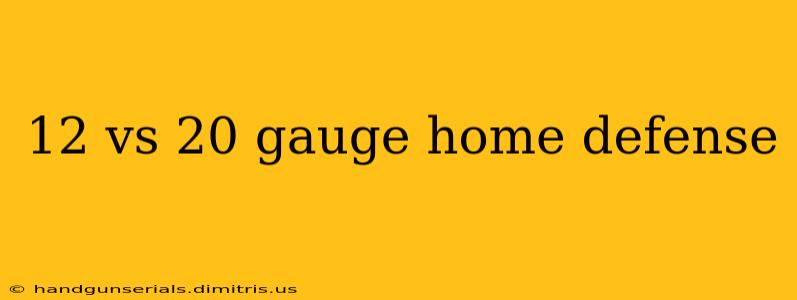Choosing the right firearm for home defense is a critical decision, demanding careful consideration of various factors. A frequent point of contention revolves around the gauge of shotgun to employ: the ubiquitous 12 gauge or the slightly smaller 20 gauge. This article delves into the nuanced differences between these two popular choices, helping you make an informed decision based on your individual needs and capabilities.
Caliber Considerations: Power vs. Control
The most significant difference between a 12 gauge and a 20 gauge lies in their shell size and consequent power. The 12 gauge, the standard shotgun caliber in the United States, packs a considerably more potent punch. This translates to greater stopping power, a crucial factor in a home defense scenario where incapacitating a threat is paramount. Larger shot payloads and heavier slugs deliver significantly more kinetic energy, increasing the likelihood of immediate effect.
However, this raw power comes at a cost. The 12 gauge's considerable recoil can be challenging for many shooters, particularly those with less experience or smaller physiques. Managing recoil effectively is crucial for accurate follow-up shots, a vital aspect of any self-defense situation. A strong recoil can also lead to flinching, reducing accuracy and increasing the chance of missing the target entirely.
The 20 gauge, on the other hand, offers a manageable recoil for a wider range of shooters. Its lighter weight and reduced kick make it easier to handle and control, especially during stressful situations. This enhanced control can lead to improved accuracy and faster target acquisition, potentially giving you a crucial advantage in a close-quarters self-defense encounter.
Summary Table: Power vs. Recoil
| Feature | 12 Gauge | 20 Gauge |
|---|---|---|
| Recoil | High | Lower |
| Stopping Power | Higher | Lower |
| Accuracy (for some users) | Potentially Lower (due to recoil) | Potentially Higher (due to easier handling) |
| Shot Capacity | Generally higher | Generally lower |
Practical Considerations for Home Defense
Beyond the purely ballistic considerations, several practical factors influence the choice between a 12 and a 20 gauge for home defense.
Recoil Management and Training:
- 12 Gauge: Requires more extensive training to manage recoil effectively. Improper handling can lead to injury or inaccurate shots.
- 20 Gauge: Easier to master, allowing for quicker proficiency. This can be a significant advantage in a high-stress situation.
Ammunition Availability and Cost:
- 12 Gauge: Widely available and relatively inexpensive.
- 20 Gauge: While available, ammunition selection might be slightly more limited, and prices may be slightly higher per round.
Weapon Weight and Handling:
- 12 Gauge: Heavier and bulkier, making it less maneuverable in tight spaces.
- 20 Gauge: Lighter and more compact, offering better handling in confined environments.
Choosing the Right Gauge: A Personalized Approach
Ultimately, the best gauge for home defense depends on the individual shooter. Consider these factors:
- Shooting Experience: Beginners or those with limited upper body strength might find the 20 gauge more manageable.
- Physical Strength: Individuals with substantial upper body strength might handle the 12 gauge's recoil with ease.
- Living Space: If you live in a small apartment, the 20 gauge's lighter weight and maneuverability might be preferable.
- Training and Practice: Regardless of the gauge chosen, regular training is crucial for developing proficiency and ensuring safe handling.
This detailed comparison highlights that there's no universally "better" gauge. The optimal choice depends entirely on your individual circumstances, physical capabilities, and training. Prioritize proper training and practice with whichever gauge you select to ensure you're prepared to handle any home defense situation effectively and safely. Consult with experienced firearms instructors and professionals to make the best decision for your unique needs.

